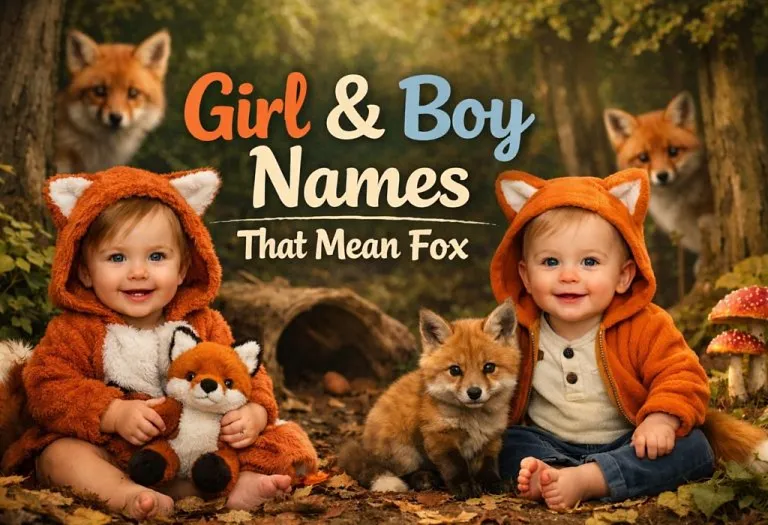Verbs That Start With Y in English (With Meanings & Examples)
- What Are The Verbs Beginning With Y?
- Common Verbs Starting With Y
- Action Verbs that Start With Y
- Positive Verbs That Start With Y
- More Verbs That Begin With Y
- FAQs
Delving into the world of verbs opens up opportunities for expression, creativity, and connection, animating our sentences and bringing our thoughts to life. Understanding and mastering these verbs can be a learning milestone. Specifically, when we explore verbs that start with ‘Y’ for preschoolers and kids, we uncover a unique subset of the English language that is fun to learn and crucial in improving vocabulary for kids.
This guide aims to introduce you to the verbs starting with the letter ‘Y,’ providing meanings and examples of their usage.
What Are The Verbs Beginning With Y?
When discussing verbs starting with ‘Y,’ we refer to action words encompassing various actions, states, or occurrences, offering a broad range of opportunities for children to express themselves and understand the world around them. From ‘yell’ to ‘yearn,’ each verb improves a child’s vocabulary and enhances their ability to communicate more effectively and creatively.
Common Verbs Starting With Y
Though fewer than other alphabets, these verbs are valuable tools in young learners’ arsenal, helping them articulate actions and emotions clearly and precisely. Here, we present verbs that start with the letter ‘Y,’ each accompanied by their meaning and an example to illuminate their use in everyday language.
1. Yawn
To open the mouth wide and inhale deeply due to tiredness or boredom.
Example: As the clock struck midnight, the little girl couldn’t help but yawn loudly, signalling it was time for bed.
2. Yearn
To have a strong desire or longing for something.
Example: She would often yearn for the summer holidays, dreaming of endless days spent by the seaside.
3. Yank
To pull something sharply or with force.
Example: She yanked the rope to signal the performers backstage that it was showtime.
4. Yelp
To emit a sharp, high-pitched bark or cry, often because of pain or surprise.
Example: The puppy would yelp playfully whenever it was tickled.
5. Yellow
To become yellow or cause to become yellow.
Example: The book’s pages began to turn yellow as they aged, giving them a vintage look.
6. Yield
To give way to arguments, demands, or pressure.
Example: After hours of negotiation, the council finally yielded to the protesters’ demands.
Action Verbs that Start With Y
English verbs starting with the letter ‘Y’ are fewer in number. Still, they are just as colourful and dynamic, painting vivid pictures of actions and behaviours. This section explores action verbs that begin with ‘Y,’ each accompanied by its meaning and an example sentence. These verbs enhance the learners’ vocabulary and encourage them to express actions more accurately and enthusiastically.
1. Yap
To bark sharply, shrilly, and often incessantly; characteristic of small dogs.
Example: The neighbour’s dog would yap whenever someone passed the house.
2. Yaw
To stagger or to weave back and forth while in motion.
Example: The ship began to yaw dangerously in the storm, tossing everyone aboard from side to side.
3. Yodel
To sing by rapidly alternating between the normal voice and falsetto.
Example: He decided to yodel as he hiked, his voice echoing through the mountains.
4. Yell
To shout something or make a loud noise with one’s voice.
Example: He yelled for help when he saw the boat was in trouble.
Positive Verbs That Start With Y
Positive verbs are pivotal in crafting sentences that inspire, uplift, and spread joy. Among these, verbs with ‘Y’ carry a unique charm. They enable us to express actions and emotions that have a positive impact on our lives and the lives of others. Let’s explore positive verbs beginning with ‘Y,’ along with their meanings and how they can be used in sentences to convey optimism, encouragement, and happiness.
1. Yarn
To tell a story, often a long and entertaining one.
Example: Grandpa would yarn tales of his youth, captivating everyone with his stories.
2. Yoke
To join in collaboration, emphasising unity and partnership.
Example: The community yoked together to rebuild the park, making it a beautiful place for everyone.
More Verbs That Begin With Y
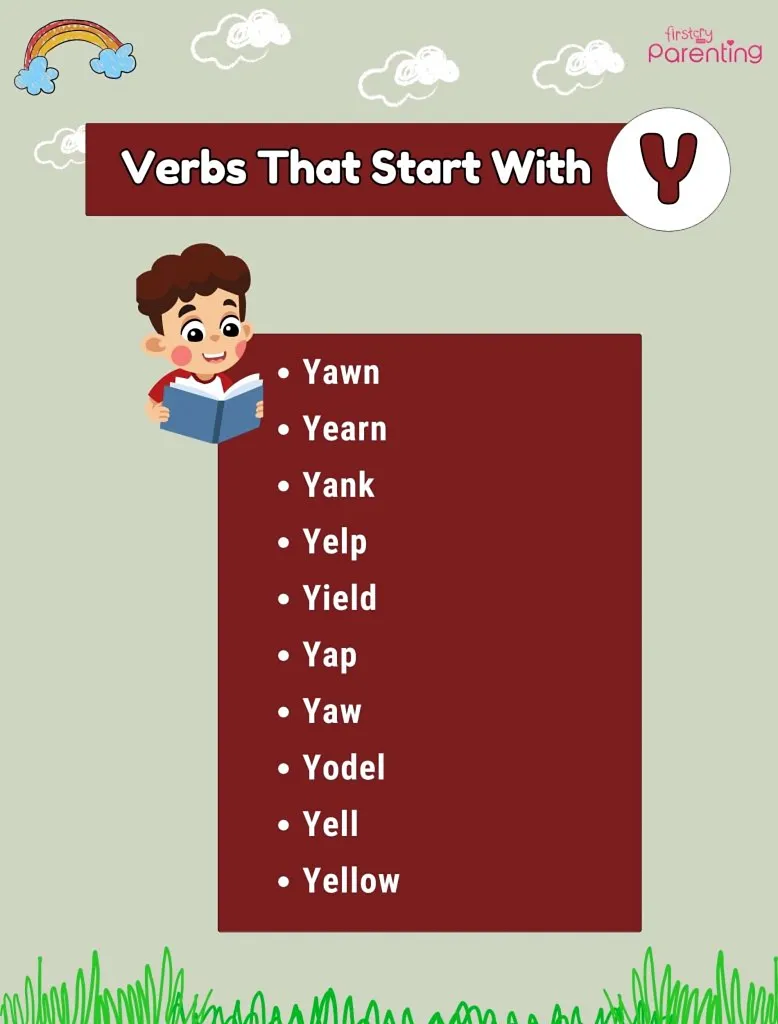
The English language holds a treasure trove of additional verbs that enrich our vocabulary and expression. These verbs, starting with the letter ‘Y,’ range from the everyday to the rarely used, offering an engaging glimpse into the diversity and depth of the language. Below is a list of verbs that start with ‘Y’ to help you expand your vocabulary.
| Verb | ||
| Yabber | Yuck | Yowl |
| Yip | Yammer | Yard |
This comprehensive list expands your vocabulary further, providing a wide range of verbs for finer and more expressive communication. Whether writing creatively, doing academic work, or simply improving your vocabulary for personal growth, these verbs offer various tools to enhance your English.
FAQs
1. What are some common uses of verbs starting with ‘Y’ in sentences?
Verbs starting with ‘Y,’ such as ‘yell,’ ‘yawn,’ and ‘yearn,’ are commonly used to describe actions, emotions, and desires, adding life and expressiveness to sentences.
2. Can verbs beginning with ‘Y’ be used in all tenses?
Yes, verbs that start with ‘Y’ can be conjugated to fit past, present, and future tenses, allowing them to be used flexibly in various contexts and sentence structures.
Exploring verbs that start with Y has taken us on a lively journey through the English language, highlighting the importance and versatility of these words in expressing actions, emotions, and states of being. Whether it’s to articulate a feeling, describe an action, or set the tone of a narrative, these verbs improve our vocabulary and enable more engaging communication. Discovering and utilising these verbs strengthens our language and comprehension skills.
Also Read: Verbs That Start With A to Z
| A | B | C | D | E | F | G | H | I | J | K | L | M |
| N | O | P | Q | R | S | T | U | V | W | X | Y | Z |
Was This Article Helpful?
Parenting is a huge responsibility, for you as a caregiver, but also for us as a parenting content platform. We understand that and take our responsibility of creating credible content seriously. FirstCry Parenting articles are written and published only after extensive research using factually sound references to deliver quality content that is accurate, validated by experts, and completely reliable. To understand how we go about creating content that is credible, read our editorial policy here.






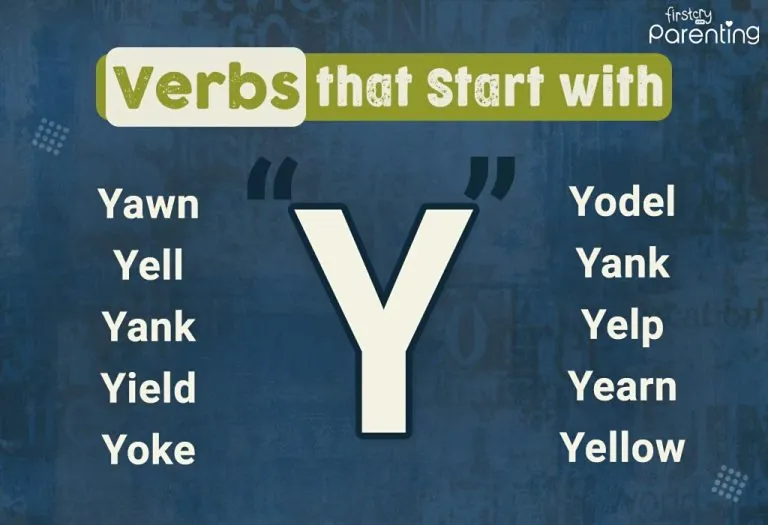

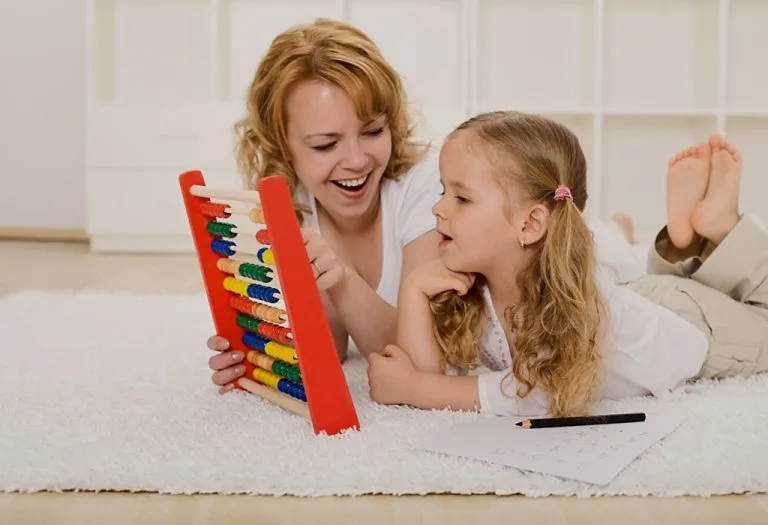
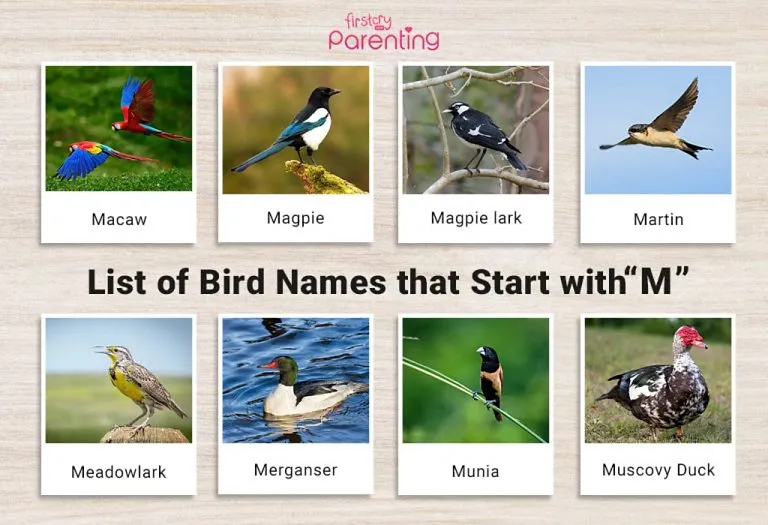




.svg)









